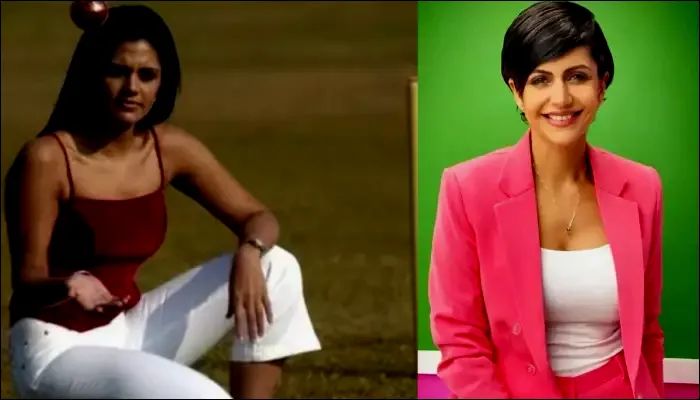In the vibrant tapestry of Indian television, one thread stands out with a striking narrative: that of Mandira Bedi. A prominent figure from the 1990s, she transitioned into the realm of cricket presentation during the electrifying 2003 Cricket World Cup. Yet, as she recently recounted, this journey traversed tumultuous terrain, laden with challenges and biases that marked her early experiences.
Mandira Bedi Reflects on Her Challenging Debut as a Cricket Presenter
During an engaging episode of Kareena Kapoor Khan’s insightful podcast, What Women Want, Mandira unearthed the intricacies of her initial week as a cricket presenter. Diving deep into her memories, she painted a vivid picture of her struggles. The cricketing greats on her panel, instead of engaging with her inquiries, seemingly dismissed them. Instead of dialogue, there was silence; the legendary players turned their attention away, offering responses that were disjointed from her questions. An air of disrespect lingered in those moments, as Bedi expressed:
“One week went by with absolute hesitation, fumbles, and mistakes. At the end of every show, I would put my head down and cry. The legends on either side of me, I would ask them questions and they just stared at me. They turned to the camera and answered whatever the hell they wanted to answer.”
A Changing Landscape for Women in Cricket
As the interview unfolded, Mandira shared a glimmer of hope. The dialogue shifted towards the evolving representation of women in sports. Today, she recognizes a burgeoning space, a place where women athletes and presenters command respect and visibility. However, she was quick to point out the scrutiny she faced as a pioneer, the first of her kind in an arena dominated by men. The critical gaze of the public often felt magnified, with whispers questioning her right to exist in this gathering of legends.
The Pressures of Presenting
With candor, Mandira opened up about the significant pressures she encountered in this male-dominated field. Tasked with drawing viewers in by posing relatable questions, she found herself grappling with the complexities of language and dynamics that felt foreign. Reflecting on her initial struggles, she shared:
“But, the channel got me on board to ask the questions (on the common person’s mind). They wanted to get new viewers, and that’s what they got me on board for. It was a hard one to begin with, because there’s a difference between sitting on a panel and talking to legends. With the cameras on, you have to speak their language.”
A Touch of Kindness from the Past
Amidst the hurdles, there shone a notable instance of respect from the legendary Mansoor Ali Khan Pataudi, her father-in-law. He approached her during the World Cup with grace and dignity, leaving an indelible mark on her journey. When she reminisced about this moment, she recounted:
“He came down for the semi-finals and finals. He was so respectful, kind, and sweet. When he met me for the first time, he shook my hand and said, ‘So you are the Mandira Bedi everyone is talking about.’ That made me feel so good and special.”
Conclusion
Mandira Bedi’s journey as a cricket presenter encapsulates a whirlwind of emotion, growth, and resilience. Her reflections spark a conversation not just about her personal experiences, but also about the broader narrative of women’s representation in sports. As she navigated doubt and disrespect, she ultimately forged a path, paving the way for future generations of women in cricket. What are your thoughts on Mandira Bedi’s experiences in the cricketing world?

